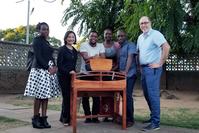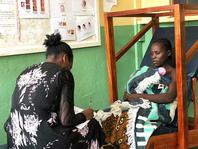Yih team designs, builds furniture to improve Malawi infant care


and crib (Download photo)
Professors Yuehwern Yih of industrial engineering and Steve Visser of industrial design, along with Sidi Deng, industrial engineering graduate student and SOS lab member, visited Malawi from May 12-14 to oversee manufacturing of prototypes of three pieces of newly-designed healthcare furniture.
The new furniture is part of the "Spatial Redesign for Family-Centered Kangaroo Mother Care Center" project, which aims to save the lives of premature babies by redesigning the layout and furniture for Kangaroo Mother Care (KMC) facilities in Malawi. Yih and her team are working with Dr. Bina Valsangkar from Save the Children to improve KMC care for low-birthweight, premature infants. They are also collaborating on the project with Dr. Queen Dube of Queen Elizabeth Hospital, and Maxwell Silla, an engineering student from the Malawi Polytechnic at the University of Malawi.
In early 2019, Yih and Visser visited three Malawi hospitals to learn more about KMC, selected a hospital in which to conduct a spatial redesign project, and met with local collaborators. The purpose of their second trip in May was to oversee building and initial testing of the new furniture prototypes: a baby crib, a Kangaroo Mother Care chair, and a nurse station.
"The baby crib is the most innovative design among the three because it is modular and space-saving," said Yih. "It holds three babies, and the top shelf can slide three inches to each side to open more space for better access to the lower cribs. The cribs are modularized and reconfigurable to accommodate different layout and space needs."
The team also designed an innovative KMC chair and a nursing station. "The KMC chair is designed for mothers providing skin-to-skin contact with their pre-term babies for long hours [which promotes improved health]," Yih explained.
"The nurse station is designed for nurses and physicians to have a mobile working station to record and review charts, and to carry essential medications and devices to provide care while they attend each baby in the unit," she added.
"The new designs are based on the results from a simulation study and a visibility analysis to improve workflow and space utilization while maximizing the visibility for better monitoring of preterm babies," Yih said. Deng did the simulation and visibility studies.
The furniture is built in Malawi, which makes the furniture more affordable and sustainable. "We use local materials and the furniture is built by local furniture builders," said Yih.
What's next? "We are looking for funding to study an intervention with the new designed furniture, new layout, and new workflow in the neonatal Intensive Care Unit (NICU) in a [Malawi] district hospital," said Yih.
The Kangaroo Mother Care program was first established in Malawi in 1999, funded in part by USAID. This program seeks to save the lives of premature infants by training mothers to keep their babies warm by carrying them in front with skin-to-skin contact, and nursing the baby regularly with a fixed schedule. Save the Children wanted to expand the KMC program in Malawi to benefit more premature babies, but experienced spatial challenges in doing so until the until the Purdue Global Engineering Shah Innovation Lab brought Save the Children and Yih together to work on this project.brought Save the Children and Yih together to work on this project.
Writer: DeEtte Starr, starrd@purdue.edu
Source: Yuehwern Yih, yih@purdue.edu
Related Link: https://engineering.purdue.edu/SOS/news/yih-malawi


